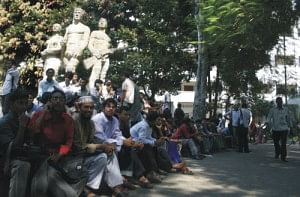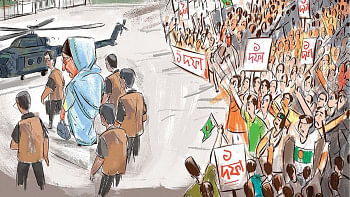Revisiting the DU Order, 1973

Photo: TANVIR AHMED/ DRIK NEWS
An article under the above caption by Dr. Kamal Hossain was published in the Daily Star of April 29. In his write-up, Dr. Hossain mentions the glorious past of Dhaka University in terms of its beautiful campus with magnificent buildings and, more importantly, its high academic standard "which earned for it recognition as a centre of excellence of an international standard."
He goes on to recollect also the social role played by its academia and students in the language movement of 1952, which sowed the seeds of nationalism in this wing of the then Pakistan. He does not forget to touch on the historic role played by the DU teachers and students in the war of liberation of 1971.
Dr. Hossain's tribute to Dhaka University stops there. The learned jurist in the latter part of his narration expresses his utter dissatisfaction at the state of affairs in the universities of Bangladesh today. His views may be summarised as follows.
For the Gono Forum president, the teachers now have egregious appetites for power politics for advancing their narrow self-interest and personal aggrandisement. He bemoans that vice-chancellors and others in powerful positions have acted as instruments of those in power. The net result of all this has led to doliokoron, or politicisation, in matters of appointments and promotions and in awarding of lucrative contracts.
He suggests that "the degeneration of the university of Dhaka through political patronisation in appointment and promotion, admissions and even granting of classes, and the patronisation of arms and party politics which reached deadly proportions in recent years must be seriously addressed."
Before we go on further, it would be better to note the tenor of Dr. Hossain's piece. He mentions that institutional autonomy to Dhaka University was granted by the DU order, 1973. It, itself, provided for elections to several bodies and high offices in the university, including that of the vice-chancellor. And the vice-chancellors themselves have become mere tools in the hands of the power that be in the country. This has led to politicisation in the university, ultimately to armed conflicts on the campus, much to the deterioration of the general atmosphere and academic pursuit in this once-famous seat of learning.
To bring back the serenity and congenial atmosphere on the campus, the 1973 DU order which, according to the author of the writing, is the root cause, should be amended -- for which a process of consultation may be taken up. He suggests that the selection to the prestigious position of vice-chancellor may be made by a search committee.
While I do not wish to contradict any part of his review of the working of the DU order, 1973, Dr. Kamal Hossain, who himself is known as a gentleman par excellence, has been, in my opinion, less than kind to the vice-chancellors of the recent past. Rather than myself being embroiled in some such unwholesome controversy, I wish to make some comments on his suggestion of selection of vice-chancellors through a search committee. Here, we may recollect the backdrop against which the demand for autonomy was voiced.
Enjoyment of academic freedom has been very dear to university dons all over the world. The struggle for institutional autonomy started some 800 years ago at the universities of Sorbonne in Paris and Oxford and Cambridge in England.
The universities of the west enjoy institutional autonomy and carry on their affairs the way they choose, although they receive considerable amounts of grants from the respective governments. And the teachers enjoy complete academic freedom. I myself spent some four years at the University of Paris, and I was amazed to see that the universities of France were fully government-funded institutions and, yet, no one ever heard of any governmental action encroaching upon the autonomous character of the universities or on the freedom of the professorial corps in academic decision-making.
It may be recalled that the character of Dhaka University was quite different from other universities of the sub-continent from the very beginning. Not only that it was patterned on the University of Oxford in being an institution of a unitary teaching character and a residential one, its 3-year Honours degree and the tutorial system also differentiated it from other universities.
Interestingly enough, it had an administrative organ, called the Court, on which was vested the supreme legislative power. This body, of which the chancellor was also an ex-officio member, included the professors and readers of the university in an ex-officio capacity. Among its members were elected representatives of the registered graduates and five elected lecturers.
One would say that the University Act, 1920 gave it enough autonomy, albeit it had to operate under strict budgetary limitations. The vice-chancellor was to be appointed by the chancellor, taking into consideration the recommendation of its Executive Council (more or less to-day's Syndicate).
After 1947, the University began to lose its earlier character. As it had to shoulder the responsibilities of the colleges it had become an affiliating university. It lost its residential character due to large influx of young people craving for higher education. And whatever autonomous character the university had was lost when the DU Ordinance 1961 was promulgated. Under this law the vice-chancellor was to be appointed by the chancellor without any process of consultation.
The vice-chancellor so appointed was given sweeping authority to run the university at his sweet will. Most important, what to speak of academic freedom, the teachers had no right to go to a court of law even to seek redress against any decision of the vice-chancellor, however arbitrary that might be. This was a draconian piece of law. Teachers were groaning under some such suffocating situation in the highest seat of learning here. Some distinguished professors had to quit the University under such unbearable circumstances. A few also left the University to take up jobs abroad.
Students, from time to time, raised their voice against the 1961 ordinance and demanded autonomy of the university. Teachers of the University came out unitedly in the wake of the anti-government agitation in 1969, demanding full autonomy of the university. Prof K S Murshid formulated a 14-point charter of demands defining the concept of autonomy. Over the next one year and a half teachers discussed various aspects of their demands, refined and finalised them.
A delegation on their behalf met Air Marshal Nur Khan, who was appointed by the new military regime to discuss demands by university teachers. Prof. Habibullah and Prof. Ahsanul Huq, president and secretary respectively of DU Teachers' Association visited West Pakistan to meet teachers' representatives of that wing to strengthen our claim for autonomy.
Teachers' representatives of the then East Pakistan also met in Dhaka to jointly put forward their demands. Came 1971. In 1972, with a new government in liberated Bangladesh, a committee was formed with Prof Razzaque at its head. Later that year, another committee with DU Vice-Chancellor Prof Mozaffar Ahmed as chairman was formed to consider the demands of the teachers for autonomy.
This committee, with Teachers' Association President Prof Habibullah on it as member, accepted all our demands. The draft of the proposed law was submitted to the government. At that time, Dr. Kamal Hossain was the minister for law and parliamentary affairs to whom I, as secretary of the Teachers' Association, accompanied by Prof Wazihur Rahman went several times to lobby for our cause.
Finally, the DU order 1973 was promulgated as President's Order no. 11 of 1973, which, however, was deemed to have taken effect on December 16, 1972. This piece of law provided for several elections to different bodies of the University and also to the office of the vice-chancellor. The raison d'etre of the formulation of the law and elections was to ensure institutional autonomy of the university, academic freedom of the teachers, and to inculcate among the teachers and the feeling of collegiate equality.
Dr. Hossain now reveals after some 35 years that the prime minister had some reservation about too many elections in the university. We also heard on the grapevine about the PM's opinion, particularly debarring teachers from taking part in parliamentary election. While all may not agree, some on the campus, and possibly a large number of the students' guardians, were appreciative of the clairvoyance of the PM.
Anyway, at the very last, Dr. Hossain prescribes that the university vice-chancellors be selected through a search committee, and not through an elective process as they are now. It may be remembered that the Education Commission of 2003 suggested the idea of selection of vice-chancellor through a search committee.
For some time past, the government has been following a process of selection through a search committee. However, there is a wide difference between the search committee method followed by the government and the one recommended by the Commission. The pros and cons of the different approaches may be discussed. We strongly feel, though, that any major change in the existing law may be brought about only after a thorough and wide-ranging discussion with all stakeholders. For limitation of space we, however, leave a fuller discussion on the matter for some future occasion.
Professor M. Maniruzzaman Miah is a former Vice-Chancellor of Dhaka University. E-mail: [email protected]

 For all latest news, follow The Daily Star's Google News channel.
For all latest news, follow The Daily Star's Google News channel. 



Comments